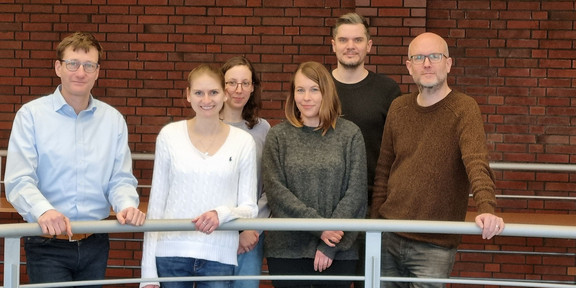2023
Research team "Innovation of Inclusion" presents at IFO

In a symposium moderated by Vertr.-Prof. PD Dr. Bastian Pelka and PD Dr. Christoph Kaletka, Dr. Jana York and Dr. Jan Jochmaring (Faculty of Rehabilitation Sciences and University of Cooperative Education Wilhelmshaven) as well as Ann Christin Schulz, Daniel Krüger and Lisa Preissner (Faculty of Social Sciences - Social Research Centre) presented research results of current projects. The symposium bundled approaches and findings from two research strands: Innovation
research looks for mechanisms of emergence and diffusion of new technologies and social practices. Inclusion research deals with the analysis and improvement of the conditions of participation. Both are united by their analytical and transdisciplinary view of transformation processes in society, their interest in participation processes and the approach of wanting to understand the framework conditions for the implementation and failure of new solutions as comprehensively as possible.
Social innovations are associated with special potentials for overcoming societal challenges. The connection between social innovations and the transformation process towards an inclusive society raises questions about the political-practical design of social innovations for more participation: Just like technological innovations, social innovations need framework conditions that make ideas discoverable, promote them, bring the right actors together and scale successful solutions.
The symposium brought together both perspectives in three contributions and addressed areas of overlap between innovation and inclusion, which the cross-faculty research group is working on together in research, teaching and transfer:
Contribution 1: Innovation of Inclusion
The first contribution by Christoph Kaletka and Daniel Krüger discussed fundamental relationships between innovation and inclusion. The contribution was based on the thesis that successful inclusion requires a variety of changes in social practices. Three categories formed the core of a new, expanded understanding of innovation: processes, goals and content of social innovation. All three categories are important for inclusion, unfold their effect in the "innovation field of participation" and help to rethink inclusion beyond purely technological developments, to better understand the success and failure of inclusion initiatives, and to plan the dissemination of successful approaches and concepts in a more targeted way, taking into account different local-regional framework conditions.
Contribution 2: Innovation and Exnovation of the Vocational Rehabilitation System
The second contribution by Jan Jochmaring, Lisa Preissner and Jana York outlined social innovations for inclusion in the field of vocational rehabilitation, such as the Budget for Work and Supported Employment, and presented scaling possibilities of these instruments. Furthermore, established systems and structures that run counter to inclusive work realities - such as existing allocation mechanisms, place quotas and refinancing mechanisms of segregating systems - were examined for their potential for ex-novation and levers for change were discussed.
Contribution 3: Innovation in research: inclusive citizen science
The contribution by Bastian Pelka and Ann Christin Schulz dealt with the increasingly important field of citizen science in research and practice and asked about the role and significance of participatory processes. Schulz and Pelka argued that citizen science can bring methodological potentials for inclusion-oriented science and especially barrier-free research. The paper reflected on the innovation and function of citizen science based on the question of the role of citizens and drew parallels to the ladder of participation according to Arnstein (2000). In addition, the accessible citizen science methodological framework of a current research project to expand the Wheelmap - a street map with barrier information - was presented and critically discussed, and demands for the promotion of accessible science were derived.
Overall, the symposium aimed at a discussion on the relationship between the two disciplines, on learning potentials from innovation research for the science and practice of inclusion, and on strengthening the topic of inclusion on the social agenda. In the discussion with the session participants, the main points of contact with other research and development projects were discussed.




![[Translate to English:] [Translate to English:]](/storages/zentraler_bilderpool/_processed_/a/f/csm_Kontakt_b86e8d8ecc.png)
![[Translate to English:] [Translate to English:]](/storages/sfs-sowi/_processed_/7/e/csm_header_collage_sfs_eving_sozialforschungsstelle_dortmund_31bd3c09fb.jpg)